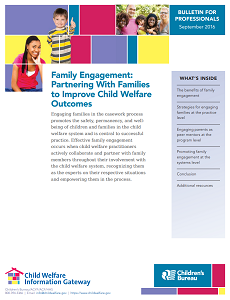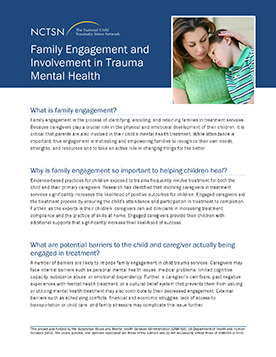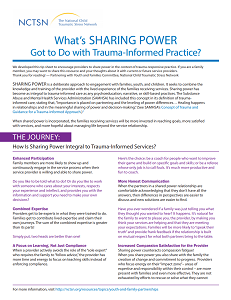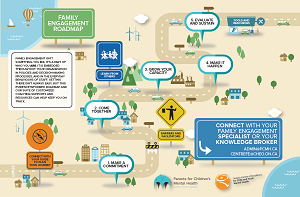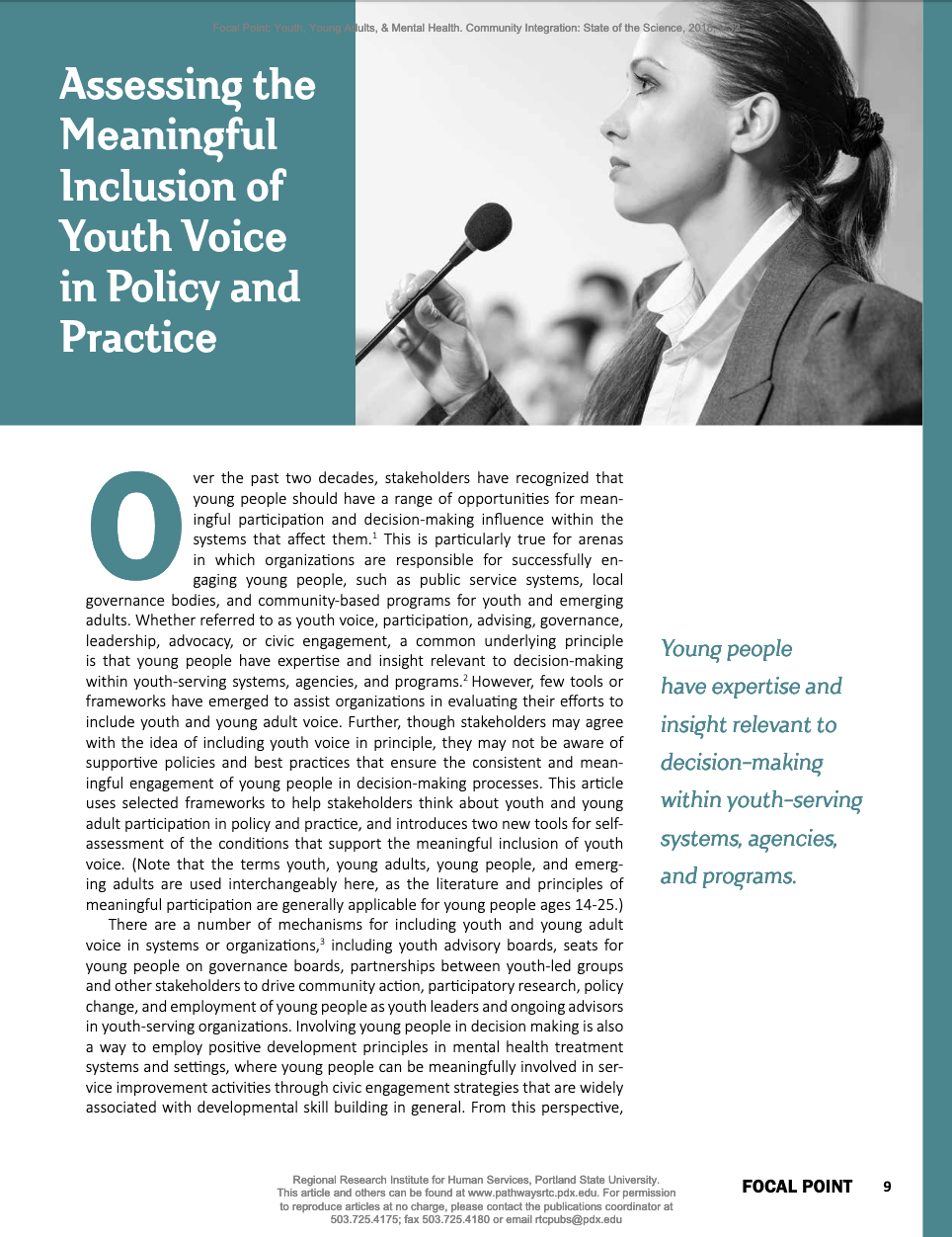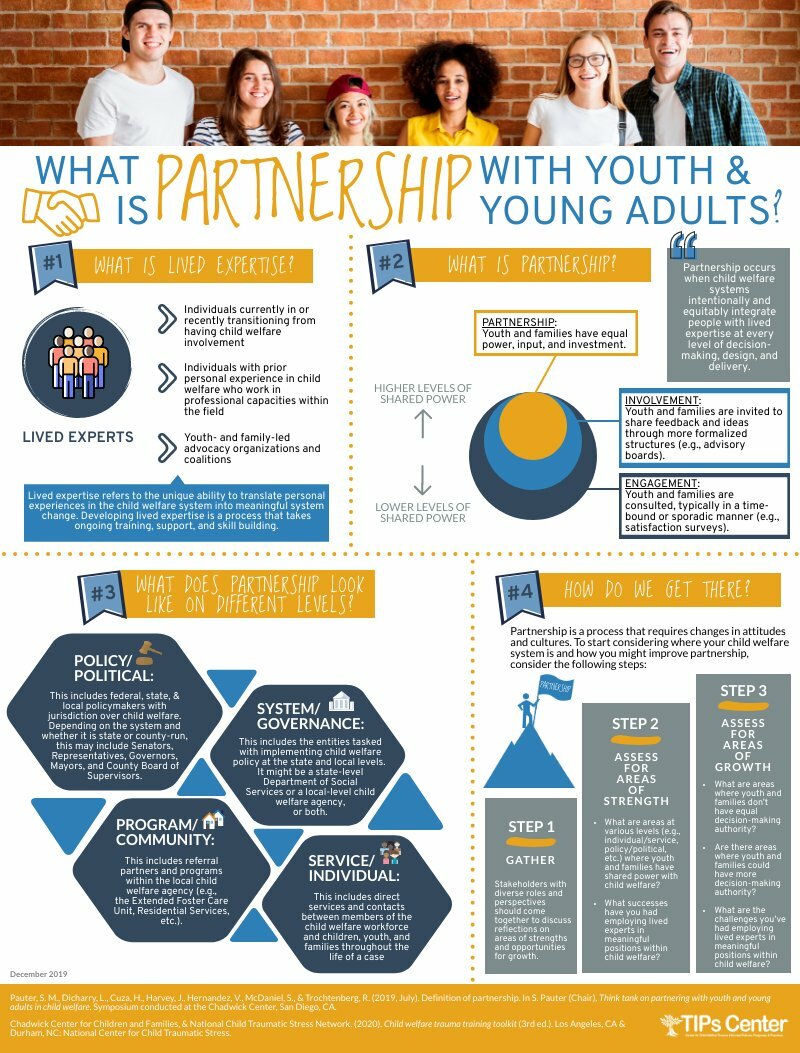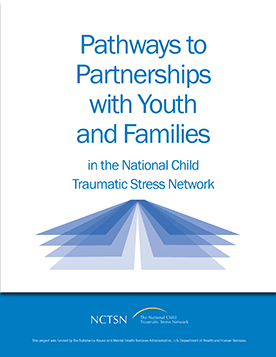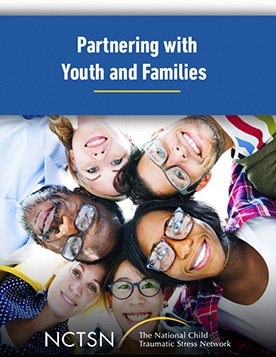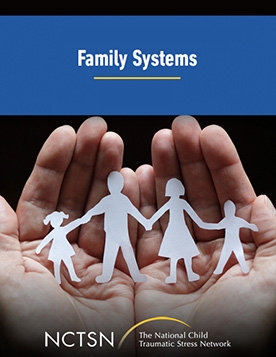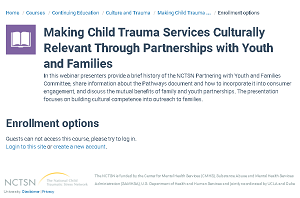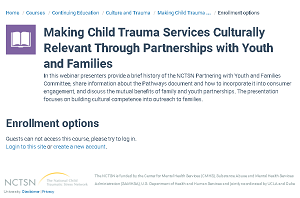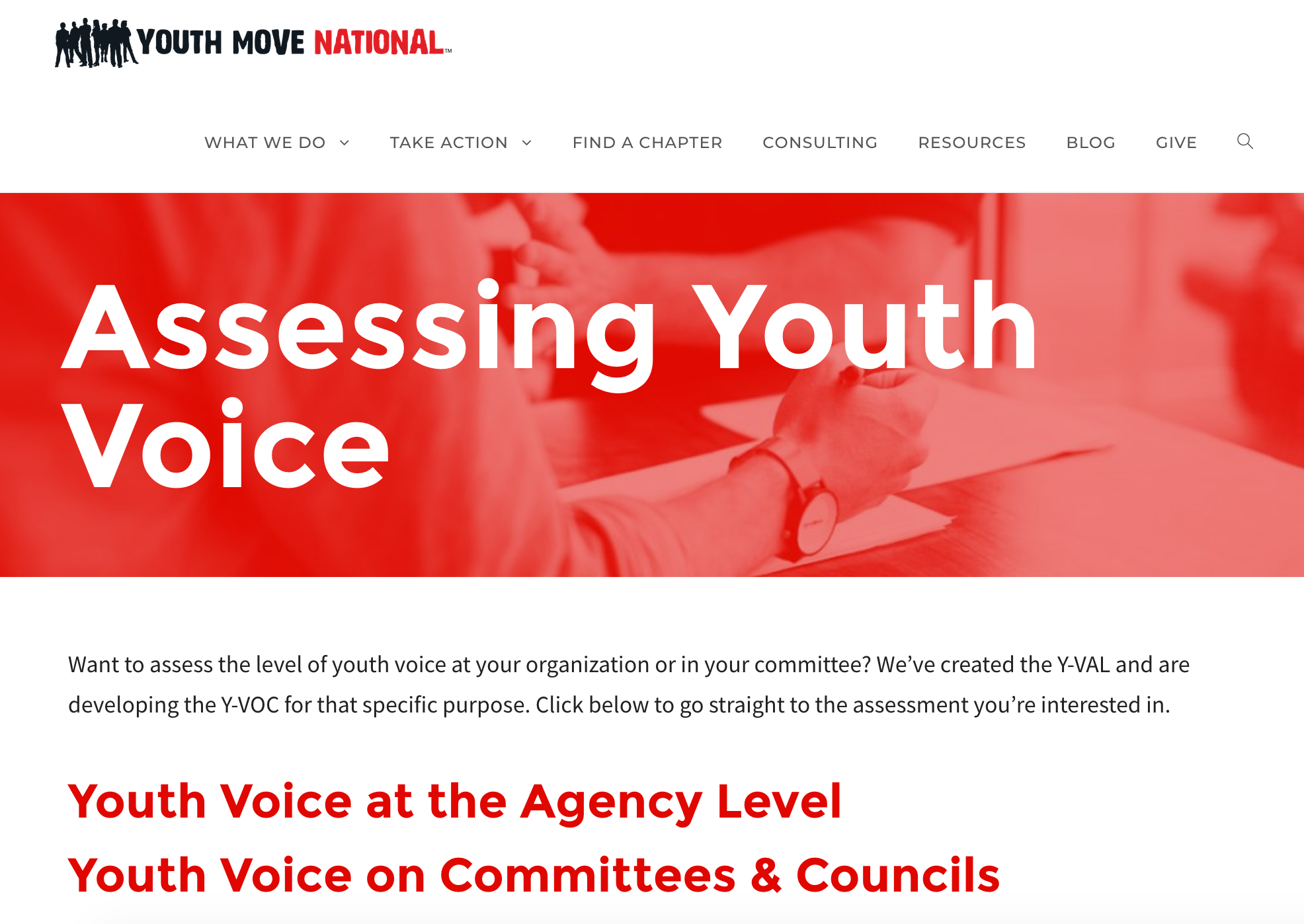-
Family Engagement
Partnering with Children, Youth, & Families
Child Welfare Information GatewayChild WelfareThis 2016 bulletin for professionals discusses the benefits and strategies for engaging families at the practice level and promoting family engagement at the systems level
-
Family Engagement and Involvement in Trauma Mental Health at a CAC
Partnering with Children, Youth, & Families
National Child Traumatic Stress Network (NCTSN)Behavioral HealthThis fact sheet provides information on the importance of family engagement and potential barriers. Discusses specific strategies for family engagement, including how MDT partners can be involved in family engagement.
-
What’s Sharing Power Got to Do with Trauma-Informed Practice?
Partnering with Children, Youth, & Families
National Child Traumatic Stress Network (NCTSN)GeneralThis tip sheet provides information to providers about how to share power in the context of trauma-responsive practice.
-
Family Engagement Roadmap
Partnering with Children, Youth, & Families
Ontario Center of Excellence for Child and Youth Mental HealthGeneralThis evidence-informed roadmap summarizes how to help organizations create a cultural shift that includes meaningfully engaging families.
-
Assessing the Meaningful Inclusion of Youth Voice in Policy and Practice
Partnering with Children, Youth, & Families
Pathways RTC at Portland State UniversityGeneralThis article uses selected frameworks to help stakeholders think about youth and young adult participation in policy and practice, and introduces two new tools for self-assessment of the conditions that support the meaningful inclusion of youth voice.
-
What is Partnership with Youth and Young Adults?
Partnering with Children, Youth, & Families
Pauter, S. M., Dicharry, L., Cuza, H., Harvey, J., Hernandez, V., McDaniel, S., Platt, M. & Trochtenberg, RChild WelfareThis infographic expands upon the conceptualization of partnership presented in the Child Welfare Trauma Training Toolkit (3rd ed.). It was developed by alumni of foster care and highlights how child welfare can integrate lived experts at all levels of the system.
-
Pathways to Partnerships with Youth and Families
Partnering with Children, Youth, & Families
National Child Traumatic Stress Network (NCTSN)GeneralThis document offers agencies a structure for examining and expanding the role of youth and families in their organizations on both the clinical and organizational levels. This document contains two self-assessment questionnaires, offers strategies for increasing youth and family involvement in all aspects of service delivery, and includes useful examples provided by one NCTSN site.
-
Pathways to Partnerships with Youth and Families
Partnering with Children, Youth, & Families
National Child Traumatic Stress Network (NCTSN)GeneralThis document offers agencies a structure for examining and expanding the role of youth and families in their organizations on both the clinical and organizational levels. This document contains two self-assessment questionnaires, offers strategies for increasing youth and family involvement in all aspects of service delivery, and includes useful examples provided by one NCTSN site.
-
Partnering with Youth and Families in Trauma Settings
Partnering with Children, Youth, & Families
National Child Traumatic Stress Network (NCTSN)GeneralThis webinar offers family and professional leadership development ideas addressing the multiple dimensions of partnership with youth and families, including advisory board development, peer-to-peer support programs, and compensation for family members, among other topics.
-
Widening the Lens - Why Include the Family?
Partnering with Children, Youth, & Families
National Child Traumatic Stress Network (NCTSN)GeneralThis webinar offered through the Learning Center of the NCTSN discusses the reasoning and importance of including a family in trauma-informed care. Reviews objectives and core therapeutic strategies that can be used with families to support positive adaptation.
-
Making Child Trauma Services Culturally Relevant Through Partnerships with Youth and Families
Partnering with Children, Youth, & Families
National Child Traumatic Stress Network (NCTSN)GeneralThis webinar offered through the Learning Center of the NCTSN provides a brief history of the NCTSN Partnering with Youth and Families Committee and focuses on building cultural competence in outreach to families. Accessing this resource requires a free registration at https://learn.nctsn.org/. Once you have a registration and are signed on you can either use the link on this page or search the name of the resource on the NCTSN Learning Center website to access this resource.
-
Partnering with Youth and Families
Partnering with Children, Youth, & Families
National Child Traumatic Stress Network (NCTSN)Behavioral HealthThis webinar offered through the learning center on the NCTSN’s website suggests practical ways to partner with youth and families within treatment settings based on different resources and organizational structures. This webinar reflects the perspectives of providers, family members, and youth. Accessing this resource requires a free registration at https://learn.nctsn.org/. Once you have a registration and are signed on you can either use the link on this page or search the name of the resource on the NCTSN Learning Center website to access this resource.
-
Partnering with Youth and Families in Trauma Settings
Partnering with Children, Youth, & Families
National Child Traumatic Stress Network (NCTSN)GeneralThis webinar offers family and professional leadership development ideas addressing the multiple dimensions of partnership with youth and families, including advisory board development, peer-to-peer support programs, and compensation for family members, among other topics.
-
Widening the Lens - Why Include the Family?
Partnering with Children, Youth, & Families
National Child Traumatic Stress Network (NCTSN)GeneralThis webinar offered through the Learning Center of the NCTSN discusses the reasoning and importance of including a family in trauma-informed care. Reviews objectives and core therapeutic strategies that can be used with families to support positive adaptation.
-
Making Child Trauma Services Culturally Relevant Through Partnerships with Youth and Families
Partnering with Children, Youth, & Families
National Child Traumatic Stress Network (NCTSN)GeneralThis webinar offered through the Learning Center of the NCTSN provides a brief history of the NCTSN Partnering with Youth and Families Committee and focuses on building cultural competence in outreach to families. Accessing this resource requires a free registration at https://learn.nctsn.org/. Once you have a registration and are signed on you can either use the link on this page or search the name of the resource on the NCTSN Learning Center website to access this resource.
-
Partnering with Youth and Families
Partnering with Children, Youth, & Families
National Child Traumatic Stress Network (NCTSN)Behavioral HealthThis webinar offered through the learning center on the NCTSN’s website suggests practical ways to partner with youth and families within treatment settings based on different resources and organizational structures. This webinar reflects the perspectives of providers, family members, and youth. Accessing this resource requires a free registration at https://learn.nctsn.org/. Once you have a registration and are signed on you can either use the link on this page or search the name of the resource on the NCTSN Learning Center website to access this resource.
-
Assessment of Youth / Young Adult Voice at the Agency Level (Y-VAL)
Partnering with Children, Youth, & Families
YouthMove National and Pathways RTC at Portland State UniversityChild Welfare, Behavioral Health, YouthThe Y-VAL is a validated tool intended to measure support for the meaningful participation of youth and young adults in advising and decision making at the agency level. The assessment was co-developed with youth and young adults and identifies the following themes required for youth-driven best practices at the agency level.
